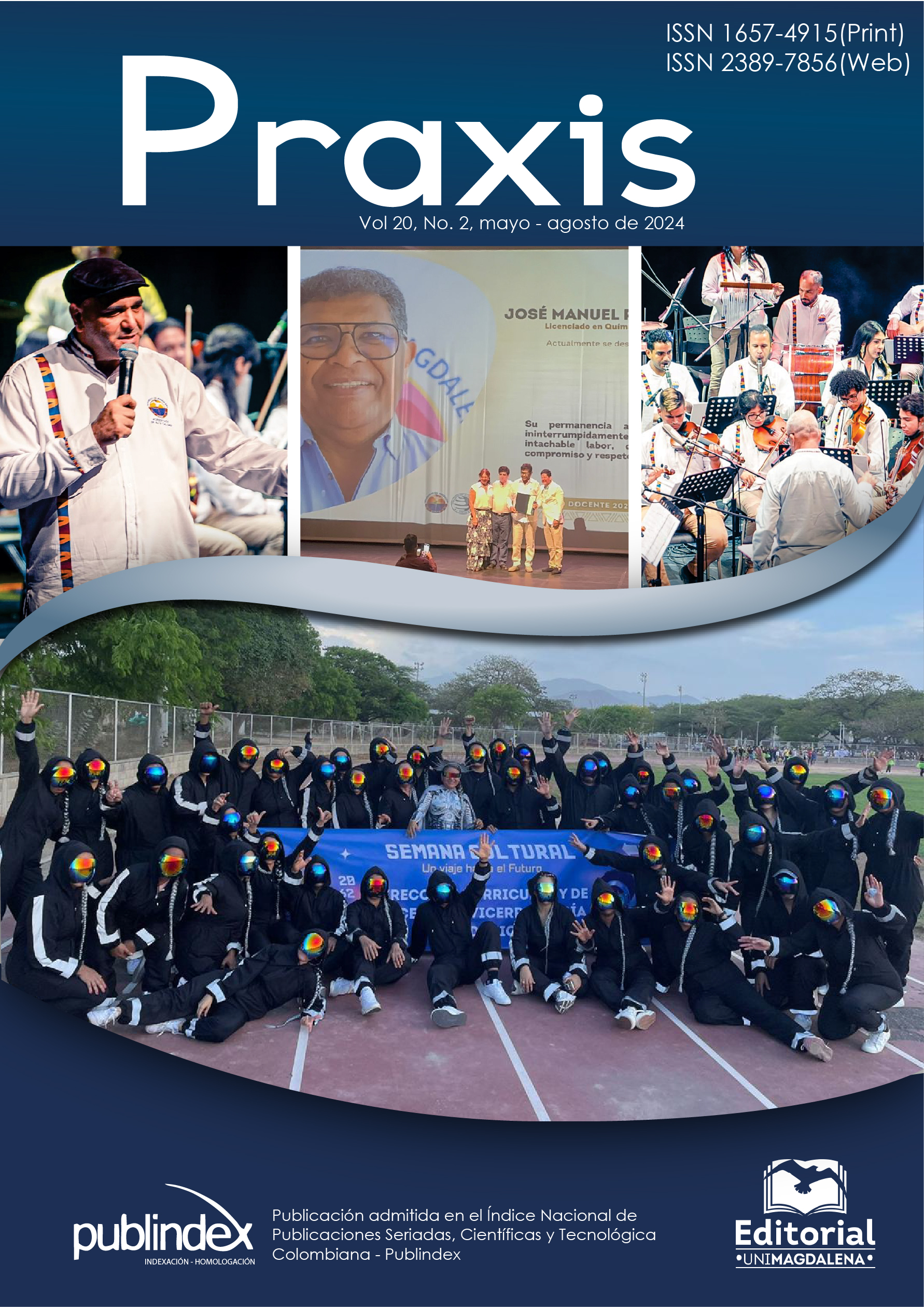THE STEAM METHODOLOGY: AN INTERDISCIPLINARY EXPERIENCE TO PROMOTE STUDENTS' ATTITUDE TOWARDS LEARNING MATHEMATICS, SCIENCE AND TECHNOLOGY
Main Article Content
Abstract
The purpose of this article was to analyze the impact of the STEM methodology, under the implementation of a Robotics project, on the attitude towards science, mathematics and technology in eleventh grade students at the Escuela Normal Superior Santa Teresita. It is proposed to use pedagogical mediations that encourage the unification of different areas such as mathematics, science and technology in this case, this being the central strategy in learning, since it allows generating motivation and attitude in students. The methodology adopted in this research work was with the analytical experimental paradigm, the quasi-experimental model was also used, the grades belonging to the last year of secondary education (2023) were taken as the population, with 72 students in total. A repeated measures ANOVA analysis was applied with the purpose of calculating the variations at the intragroup and intergroup level, for this purpose the free SPSS software version 29 was used. The results showed that under the STEAM methodology, students improve their attitudes, for the reason that they work in an active and practical way. In conclusion, the STEAM method is established as a novel technique, where schoolchildren work on important skills for their training, such as; creativity, interactionist work,
Downloads
Article Details

This work is licensed under a Creative Commons Attribution-NonCommercial-ShareAlike 4.0 International License.
References
Aparicio, W. O. (2023). La Inteligencia Artificial y su Incidencia en la Educación: Transformando el Aprendizaje para el Siglo XXI. Revista Internacional de Pedagogía e Innovación Educativa, 3(2), 217-229. https://doi.org/10.51660/ripie.v3i2.133
Aparicio, O. Y. y Ostos, O. L. (2018). El constructivismo y el construccionismo. Revista Interamericana de Investigación, Educación y Pedagogía RIIEP, 11(2), 115-120. https://doi.org/10.15332/s1657-107X.2018.0002.05
Arroyo, A. y López, S. (2024). Prácticas Pedagógicas y usos de las tecnologías en una comunidad indígena en Colombia. Praxis & Saber, 15(40), e15054-e15054. https://doi.org/10.19053/22160159.v15.n40.2024.15054
Castro-Campos, P. A. (2022). Reflexiones sobre la educación STEAM, alternativa para el siglo XXI. Praxis, 18(1), 158-175. https://doi.org/10.21676/23897856.3762
Causil, L. A. y Rodríguez, A. E. (2021). Aprendizaje Basado en Proyectos (ABP): experimentación en laboratorio, una metodología de enseñanza de las Ciencias Naturales. Plumilla Educativa, 27(1), 105-128. 10.30554/pe.1.4204.2021
García, M., Velázquez, G. D. C., Vargas, A. y Sepúlveda, G. E. (2022). Actitud de los estudiantes en clases virtuales de matemáticas durante la pandemia covid-19: Ingeniería petrolera de la UPGM. Ciencia Latina Revista Científica Multidisciplinar, 6(3), 2512-2524. https://doi.org/10.37811/cl_rcm.v6i3.2396
Gopalan, M., Rosinger, K. y Ahn, J. B. (2020). Uso de diseños de investigación cuasiexperimentales en la investigación educativa: crecimiento, promesas y desafíos. Revista de Investigación en Educación, 44(1). https://doi.org/10.3102/0091732X20903302
Guamán, N. A. (2023). Teoría conectivista en el aprendizaje de derivadas con estudiantes de bachillerato. Prometeo Conocimiento Científico, 3(1), e13-e13. https://doi.org/10.55204/pcc.v3i1.13
Husén, T. (1988). Paradigmas de investigación en educación. Intercambio, 19(1), 2-13. http://dx.doi.org/10.14516/fde.710
Krause, A. (2021). El paradigma como herramienta de análisis crítico en educación/educación especial. Revista Internacional de Educación Especial, 36(1). 10.52291/ijse.2021.36.5
Llanos-Ruiz, D., Ausín-Villaverde, V. y Abella, V. (2023). Percepción de alumnos y familias sobre la robótica educativa en la educación no formal. Education in the Knowledge Society (EKS), 24, e31351-e31351. 10.14201/eks.31351 | e31351
MEN. (2006). Estándares Básicos de Competencias en Lenguaje, Matemáticas, Ciencias y Ciudadanas. https://www.mineducacion.gov.co/1621/articles-340021_recurso_1.pdf
MEN. (2022). Orientaciones curriculares de tecnología e informática.
Mendoza, A. M. A., Mora, M. C. D., Angulo, M. C. D., Chancay, D. S. D. y Vidal, M. L. P. (2023). Metodología STEAM e interdisciplinariedad: dos aliadas en la transformación curricular. Revista Científica FIPCAEC (Fomento de la investigación y publicación científico-técnica multidisciplinaria), 8(4), 32-49. https://doi.org/10.23857/fipcaec.v8i4.900
Pertuz, J. M. A., & Carmona, R. J. C. (2024). STEAM para el desarrollo del pensamiento matemático: una revisión documental. Praxis, 20(2). DOI: http://dx.doi.org/10.21676/23897856.5783
Piedra, J. C., Salazar, I. E., Vílchez, C., Cortez, H. O., García, B. L. y Amaya, K. L. (2023). La Inteligencia Artificial al servicio de la gestión y la implementación en la educación. https://doi.org/10.31219/osf.io/z2y7c
Pineda, D. Y. (2023). Enfoque STEAM: Retos y oportunidades para los docentes. Revista Internacional de Pedagogía e Innovación Educativa, 3(1),229-244. https://doi.org/10.51660/ripie.v3i1.115
Quevedo-Benítez, K. P., Rodríguez-Velandia, D. A., Moran-Borbor, R. A., Niño-Vega, J. A. y Fernández-Morales, F. H. (2024). Fortalecimiento de competencias en innovación tecnológica: una estrategia didáctica apoyada en el Aprendizaje Basado en Proyectos. AiBi Revista de Investigación, Administración e Ingeniería, 12(1), 47-54. 10.15649/2346030X.3657
Restrepo-Millán, L. E. y Candela-Rodríguez, B. F. (2020). Enseñanza de la discontinuidad de la materia a través de la estrategia de Aprendizaje Basado en Problemas. Praxis, 16(2), 199-214. https://doi.org/10.21676/23897856.3451
Tello, A. F. M., & Calderón, D. M. D. (2024). Motivación intrínseca y su relación con el aprendizaje del factor común. Praxis, 20(1). DOI: http://dx.doi.org/10.21676/23897856.5465
Vaca, C. F., Rosero, C. X., Reascos, Y. L. y Bermeo, B. N. (2024). Validación de instrumento para evaluar multitarea y actitudes tecnológicas en universitarios de ciencias de la salud. Revista Eugenio Espejo, 18(1), 82-97. https://doi.org/10.37135/ee.04.19.08
Villar, P., Arancibia-Carvajal, S., Robotham, H. y González, F. (2022). Factores que inciden en la actitud hacia el aprendizaje de las matemáticas en primer año de ingeniería. Revista Complutense de Educación, 33(2). https://dx.doi.org/10.5209/rced.74356

